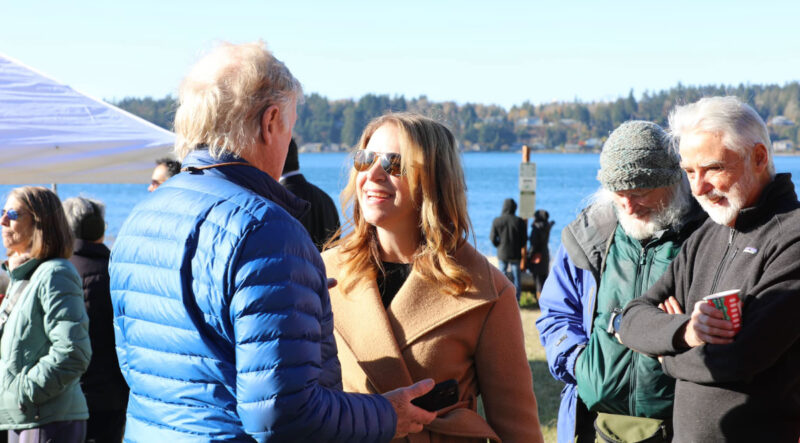Court reins in ‘politically motivated’ rush to dismantle fish farms
“Modern, well-regulated aquaculture is the environmentally responsible solution for producing seafood and exercising our Tribal treaty rights — now and into the future,” – Ron Allen, CEO and chairman of the Jamestown S’Klallam Tribe.
By Fabian Dawson
SeaWestNews
A court has ordered Hilary Franz, the Commissioner of Public Lands in Washington State to rein in her “unscientific and politically motivated” push to shut down Cooke Aquaculture’s fish farming operations in Puget Sound.
The Superior Court of the State of Washington granted the motion, which was filed by Cooke, yesterday. The original deadline of Jan. 14 has now been moved to April 2023.
Cooke, which raises native Steelhead trout in partnership with the Jamestown S’Klallam Tribe, sought the preliminary injunction to secure a reasonable period of time to safely harvest the fish, and remove the equipment remaining at the Puget Sound sites.
Franz, in a pre-Christmas move abruptly issued notices to Cooke to stop its operations, and followed it up with an executive order to ban the State’s 40-year tradition of fish farming in Puget Sound.
She also refused to allow Cooke more time to harvest the fish in the pens – representing 2,656,000 meals – and the requested period to shut down the sites safely.
“The arbitrary timelines originally set forth by (Franz) were impossible to meet without exposing Cooke employees to dangerous winter working conditions, increasing perceived environmental risks, and causing significant financial harm,” said Joel Richardson, Cooke’s Vice President of Public Relations.
“Cooke can now remove the fish on its original harvest schedule and properly remove our equipment without subjecting employees to unnecessary risk,” he said
Cooke is also challenging the entire decision imposed by Franz, saying the leases were wrongfully denied by citing a Washington state Supreme Court ruling affirming farming native species of fish in state waters.
In that decision, the Washington State Supreme Court found unanimously the claims about disease and sea lice impacting wild stocks – that have been propagated by anti-fish farm activists in the Pacific Northwest – to be without merit.
These same activists are now behind Franz’s re-election campaign and potential run for the governorship of Washington.
Franz has so far not made any mention of a series of rulings and peer-reviewed scientific studies that show Cooke’s operations in Washington State has little to no adverse environmental impact to wild stocks in the area.
“Right after announcing the lease application denials and holding a press conference on the ban, Commissioner Franz pivoted to using the announcement to fundraise for her re-election campaign, a stinging insult to those employed by the aquaculture industry in the state” said Richardson.
Pressure is also mounting on Franz, to explain her “political decision” to ban commercial net pen aquaculture in the state.
A broad range of US national, state, and species-specific trade associations, fisheries scientists, resource economists, and veterinary medicine professionals, have sent Franz a letter saying they are concerned at the lack of peer-reviewed science and historical data that would support the ban.
“We believe that a third-party review is needed to show that Franz’s order has no basis in scientific fact and is, in essence, an unsupported action by a government agency,” the letter stated, adding; “Most of the US seafood industry believes the order to be just plain wrong.”
Meanwhile, the Jamestown S’Klallam Tribe has sued Franz saying her unilateral orders violates its sovereign rights.
“Modern, well-regulated aquaculture is the environmentally responsible solution for producing seafood and exercising our Tribal treaty rights — now and into the future,” said Ron Allen, CEO and chairman of the Jamestown S’Klallam Tribe.
“By taking legal action…the Jamestown S’Klallam Tribe is strongly defending its sovereign right of self-governance and self-reliance by utilizing marine net-pen aquaculture to provide traditional sustenance and guarantee tribal food security from our established fishery in our usual and accustomed treaty area in Puget Sound and the Salish Sea,” said Allen.
“Jamestown, as a sovereign nation, must be able to enter such ventures to protect their way of life, ensure food stability, and preserve the cultural rights of their people as they see fit.
“The commissioner’s complete ban still effectively prevents tribes from entering into commercial ventures with non-Indians who possess particular expertise in this area, thereby substituting their decisions for the tribes. This directly interferes with tribal sovereignty,” said the court filing.
The Washington court cases mirror the botched political overreach involving a ministerial order to phase out salmon farms in the contentious Discovery Islands of British Columbia.
That decision by former Canadian Fisheries Minister Bernadette Jordan was made despite nine-peer reviewed scientific studies which found farmed salmon pose minimal risks to migrating wild stocks in the Discovery Islands.
The Federal Court of Canada last April ordered the government to set aside its decision to phase out the Discovery Islands salmon farms after reaffirming an earlier ruling that “salmon aquaculture in B.C. poses no more than a minimal risk to wild salmon.”
Joyce Murray, who replaced Jordan as Fisheries Minister is currently overseeing a plan to transition open-net aquaculture operations in British Columbia.
(Facebook image shows Hilary Franz, the Commissioner of Public Lands in Washington State, with her supporters)

